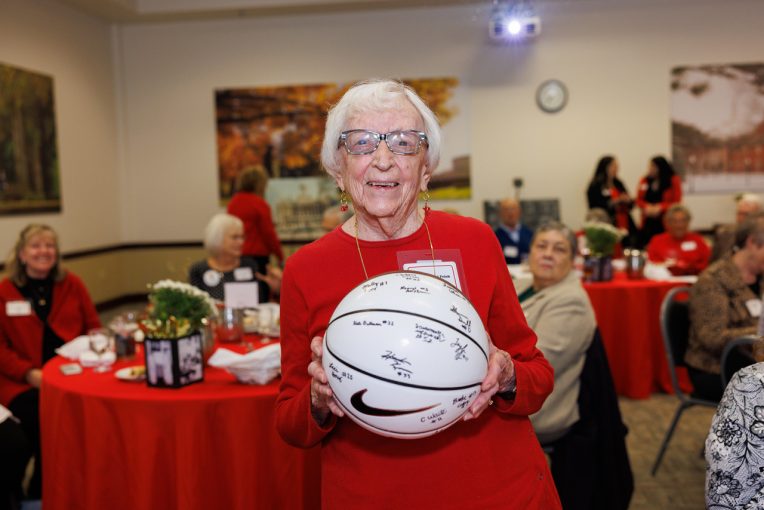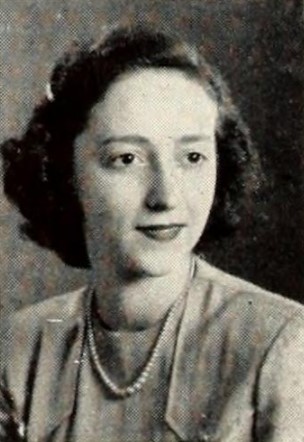Born in 1926, Redbird alum Melba Jean Frink ’48, M.S. ’73, has a story intertwined with the rich history of Illinois State University, spanning seven decades and witnessing transformative changes on campus.
Frink’s early years were marked by the challenges of wartime America. In 1944, during World War II, she graduated as the valedictorian of her high school class. She received a full scholarship that was earned due to her outstanding high school achievements, having an opportunity to study at Illinois State Normal and Wesleyan universities. Frink pursued her passion for education, eventually finding her way to Illinois State Normal University.
Frink had known from an early age that she wanted to be a teacher, making the decision to attend ISNU more concrete as she knew the school had an excellent reputation in the education field.
During her time at ISNU, Frink also was a valued member of the women’s basketball team. “We had to try out every year to be on a team, but always remained close friends. I kept in touch with Dorothy Carens, who also was a guard, throughout our lives until about two years ago, when she passed. She was like a sister,” Frink said.
In those days, women’s sports faced their own set of challenges, but she and her teammates persevered, demonstrating their skills and passion for the game. Frink’s achievements on the basketball team were not just personal victories; they were milestones in the journey toward gender equality in sports. Frink was also a member of the Honorary Basketball Club with over 20 female members and the Intramural Recreational Sports Association for Women, where they had an opportunity to exchange experiences and help each other grow and learn. “We did a lot of demonstrating at other states’ schools of a technique called shifting zone defense, which was very new, and I’m pretty sure that’s why I needed a hip replacement!” she said, laughing.
Reflecting on her experiences, Frink recalls the unique dynamics of campus life during the war era. She remembers the establishment of an all-women’s marching band. There were no men on campus, and the administration decided to include women from the concert band, which was also made up of mostly women, and a couple of men who couldn’t serve due to physical ailments.
“It was a Homecoming season, and people wanted a marching band. The director asked how many of us were in a high school marching band, and lots of us had the experience. We ended up having an all-women marching band. We were one of the first, if not the first ones, to do it. And when men came back after the war ended, they couldn’t keep women out of it. And since that year we have a mixed marching band,” she added.
It wasn’t easy being a student during a time of war, but Frink loved every single thing about ISNU. During her time on campus, the Quad was the center point of the University, making it one of her favorite places to wander and take in the campus. There were not many study spaces, so often she and other students would find it comforting to do homework lying on the grass. Classes had limited space as the University expanded, but professors stayed attentive to their students. The most drastic change that Frink recalled was ISNU’s transition from a teaching university to a general one. It was an important step for a school to become well-known and well-rounded not just in the area but in different states. Frink believes that more opportunities opened with this decision.
After the war, the campus community changed in many ways as well. For instance, more women were enrolled in classes and getting a four-year degree instead of a basic two-year. There was a need for more professionals in different fields, so the campus started to be more diverse. Another change was that of married couples, like Frink and her husband, Howard, became a common sight on campus. Living in Cardinal Court, a housing complex for married students, they navigated the post-war era together.
“Lots of people got married at that time. There were no dorms, except the Fell Hall. But married couples could live in Cardinal Court, the original one. The rest lived at someone else’s houses with the meal plan options. So, there were even some perks to being a married couple,” she said.
Despite societal norms that limited opportunities for women, Frink pursued her teaching career no matter the obstacles. She taught kindergarten and fourth grade, balancing her professional life with her roles as a wife and mother by working part-time. Armed with a double major in biology and physical education, she had the best career in her opinion. Frink said that the most rewarding part of being a teacher is to be still able to meet people in Normal that she’s had in kindergarten. “Some of my kindergarteners still send me messages on Facebook and wishing me happy birthday,” she noted. Her dedication led her to earn her master’s degree in education in 1973 while raising her two daughters. For a while, neither her kids nor her husband knew that she was working at the same time because she left the house after they had gone and returned before the family did. Getting her master’s was a real challenge. Having no academic background in early childhood education, she had to knock on many closed doors until one of the professors approved her enrollment. She said it was all worth it in the end, no matter what women had to go through at that time to build a career. A pivotal moment Frink had to face as she built her own career was being fired from her first job after it was discovered she was pregnant. It was a common and completely normal event for women then.
Women also didn’t have many opportunities to grow professionally thanks to the glass ceiling complex. A career in education was a traditional path for women, but even there they would rarely climb the ladder to hold an administration role. ISNU wasn’t different from other schools when it came to women in leadership, but Frink has seen over the years how this has progressed through acts such as Title IX and equal opportunity. “There were lots of changes that I’ve seen at ISU. Like having women taking more leadership positions on campus. And it’s all for the best. It’s great to see them being recognized,” she mentioned.
Breaking away from the traditional narrative of women’s paths, Frink decided to look at the world beyond the classroom and beyond Illinois. Some say that only people in their twenties can travel a lot, but Frink and her husband had so much curiosity that it led them to explore different cultures worldwide no matter their age. Howard, a World War II veteran, brought a broader perspective into their lives. His experiences in the West Pacific during the war made them aware of the world outside of America. After they retired, the Frinks were able to explore six continents, connecting with people and cultures different than their own.
The Frinks visited many countries, but Kenya left a lasting impression. They had friends there who were missionaries and teachers. They visited them multiple times and got to experience the rich culture and natural beauty of the country. Each trip was a unique adventure, and Kenya became one of their favorite destinations in Africa.
Yet, as their global adventures continued, Frink remained rooted in her commitment to education and ISU. She became a huge part of the Half Century Club, a link to her connection with the ISU community. This event provides a platform for alumni to reunite, share memories, and celebrate 50 years post-graduation along with milestone years. For Frink, it was not just a gathering; it was a chance to reconnect, rekindle friendships, and relive her treasured memories of ISU. Frink said that what she loves the most is coming up with new ideas for the Half Century Club with Alumni Engagement.
“In fact, I’d like to share this with you: Juliana (Juliana Nelson, an assistant director for Alumni Engagement) was able to bring me food from the grocery store several times during COVID-19. So that tells you how much of a family we get to be when we’re in that group,” she said and smiled.
As she reflects on her 75th anniversary of receiving her bachelor’s degree and the 50th anniversary of her master’s degree, Frink remains grateful for the experiences that shaped her life. The changes she witnessed at ISU mirrored the broader transformations in society. In a world that often dictated limited roles for women, Frink’s story stands strong, reminding all that determination, education, and the pursuit of one’s dreams can overcome any obstacle. Her legacy continues to inspire, making the path for future generations, and proving that one can achieve the extraordinary.
Her advice to all Redbirds echoes her own and Howard’s journey. “Maybe I could be an encouragement to someone else to hang in there!” she said. “And most importantly, don’t be afraid to try something that you think you might not do well. You’d be surprised how it can turn out.”


